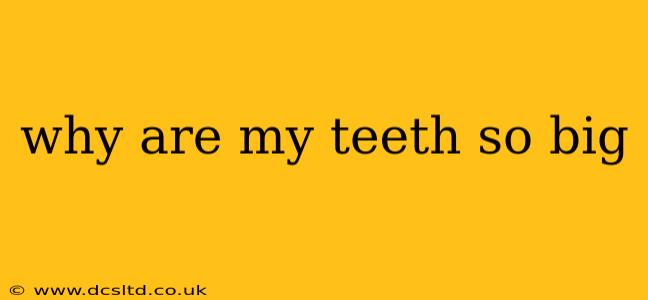Many people worry about the size of their teeth, wondering if they're too large or out of proportion with the rest of their face. It's a common concern, and the reasons behind perceived large teeth are varied. This article explores the factors influencing tooth size and offers insights into potential solutions if you're unhappy with your smile's appearance.
What Determines Tooth Size?
Several factors contribute to the overall size and shape of your teeth:
-
Genetics: This is arguably the most significant factor. Your genes largely dictate the size and shape of your teeth, inherited from your parents and ancestors. Family history of larger teeth significantly increases the likelihood of having larger teeth yourself.
-
Development: Tooth development begins even before birth and continues throughout childhood and adolescence. Nutritional deficiencies during these critical periods can affect tooth size and enamel formation. Illnesses or trauma during development can also impact tooth size and structure.
-
Jaw Size: The size and shape of your jawbone play a crucial role. If your jaw is smaller than average, your teeth might appear larger because they're crowded within a limited space. Conversely, a larger jaw can make teeth appear smaller, even if they're individually quite large.
-
Angle of the Teeth: The way your teeth are positioned within your jaw also impacts their perceived size. Teeth that are slightly protruded or rotated can look larger than they actually are.
Are My Teeth Really Too Big, or is it Perception?
It's important to distinguish between objectively large teeth and a subjective perception of large teeth. What one person considers "too big" might be perfectly normal for another. Factors influencing perception include:
-
Facial Features: The overall proportions of your face influence how your teeth appear. A smaller face might make teeth seem larger, while a larger face can make them appear smaller, even if the tooth size is identical.
-
Lip Thickness: Thin lips can draw more attention to the teeth, potentially making them seem larger. Fuller lips often partially conceal teeth, reducing their apparent size.
-
Smile Line: The way you smile also affects how your teeth are displayed. A gummy smile, for instance, can make teeth seem smaller by showing more gum tissue.
Why Do My Teeth Seem Bigger Than Others? (Addressing Common Concerns)
This section directly addresses common questions related to perceived large teeth:
Why are my adult teeth bigger than my baby teeth?
It's quite normal for adult teeth to be significantly larger than baby teeth. Baby teeth are temporary and designed to accommodate the growth of the jawbone. Adult teeth are permanent and larger to better function for chewing and biting.
Can my teeth get bigger over time?
Generally, your teeth won't get significantly larger after they fully erupt. However, gum recession can occur with age, making teeth appear larger as more of the tooth structure becomes visible.
What can I do if I'm unhappy with the size of my teeth?
If you're concerned about the size of your teeth, consulting an orthodontist or cosmetic dentist is recommended. They can assess your individual situation, explain the underlying causes, and discuss various treatment options, including:
- Orthodontic treatment (braces or Invisalign): To improve tooth alignment and create a more balanced smile.
- Cosmetic dentistry procedures: Such as bonding, veneers, or crowns, to alter the shape and size of individual teeth.
Remember, your smile is unique, and there's no single standard for "perfect" tooth size. A professional consultation will help you make informed decisions based on your individual needs and preferences. Don't hesitate to seek professional advice if you're unhappy with the appearance of your smile.
